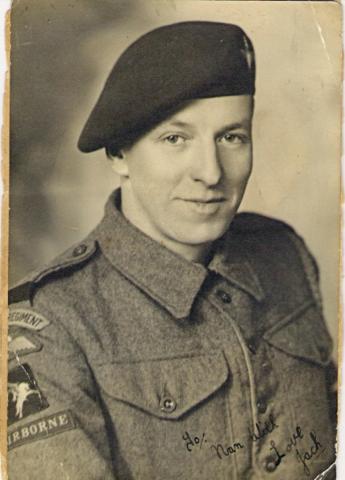John Clint Wray, known as 'Jack', son of James Arthur Wray and Jessie Bosward, was born in Everton in 1919. He would later say he was born in the USA, but he meant 'up stairs attic'(!). His mother Jessie died when he was 12 years old. Jack suffered from Tuberculosis as a boy and was admitted to hospital for a year.
Jack Wray enlisted in Liverpool in May 1935, and joined the Lancashire Fusiliers as a Boy Soldier aged 15 years old. He became part of the Army Band as a Drummer Boy, and later as a Bugler. After initial training he was posted to China in December 1935. In three years in China to October 1938, he later told family he learnt to swim in the China Sea before the Regiment was posted to India. While abroad his problems with illness returned when he contracted malaria. His unit remained in India after the outbreak of war in 1939, and he stayed in India until he finally returned to the UK in April 1943.
Back in the UK, he volunteered to join the Airborne Forces of the Army Air Corps in the Summer 1943. He completed his Parachute Course No 82 in mid-August 1943 with the comments: 'Satisfactory jumper, tries very hard, exits weak'.
After months of training he took part in the 6th Airborne Division D-Day landings in Normandy. He was part of the Battalion when it finally liberated Ranville, before returning to the UK in the Autumn.
Jack Wray took part in the 6th Airborne response to the German counter-attack in the Ardennes during Winter 1944-5, before returning to the UK once more for the next Airborne operation in March 1945. Reports later indicated Private Wray had a lucky escape from his transport aircraft during the Rhine Crossing operation. An eye-witness account from Lt Merril J Jackson reported the destruction of a Dakota C-47 over their Rhine Crossing dropzone. Pte Wray was one of 19 paratroopers listed who successfully jumped from the Dakota before it was hit over the DZ. Now a member of B Company, he went on to complete the March to the Baltic in May 1945 as the war came to an end. He was awarded four medals for his wartime service, and had been twice wounded. A shrapnel wound left a fragment embedded in his neck for the rest of his life.
Jack later told family he remembered serving with the actor Alan Badel, then a Sergeant in 13th Battalion. Few of Badel's fellow soldiers had believed him when he said he was an actor, and Jack Wray only realised he was telling the truth when he saw him on television after the war, playing the lead many years later in the Count of Monte Cristo(1964).
After the war, a family letter indicates he had become the Batman of Major Gethin, whilst based in the UKbefore he finally left the Battalion in Spring 1946. He rejoined the Lancashire Fusiliers in May 1946, leaving for the Army Reserve on Boxing Day 1946. As a Reservist, he moved on to become a Paratrooper in the Territorial Army until the 1960s.
He met his wife, Hannah Brierley, usually known as 'Nan' or 'Ann', was a WAAF girl based at Stafford during the war, from a mutual friend in 12th Battalion, L/Sgt Herbert Rymer (who was later Killed in Action in January 1945). They were married in June 1945 and brought up six children. After setting up the family home in Liverpool, employment was scarce and Ann was homesick for the Nort-East, so the family moved to Newcastle-upon-Tyne. Jack became a Postman at Heaton Road, Post Office in Newcastle and worked there for 27 years. He also became the Secretary of the Heaton Post Office Union.
Jack Wray died in June 1978, aged 58 years old.


Latest Comments
There are currently no comments for this content.
Add Comment
In order to add comments you must be registered with ParaData.
If you are currently a ParaData member please login.
If you are not currently a ParaData member but wish to get involved please register.